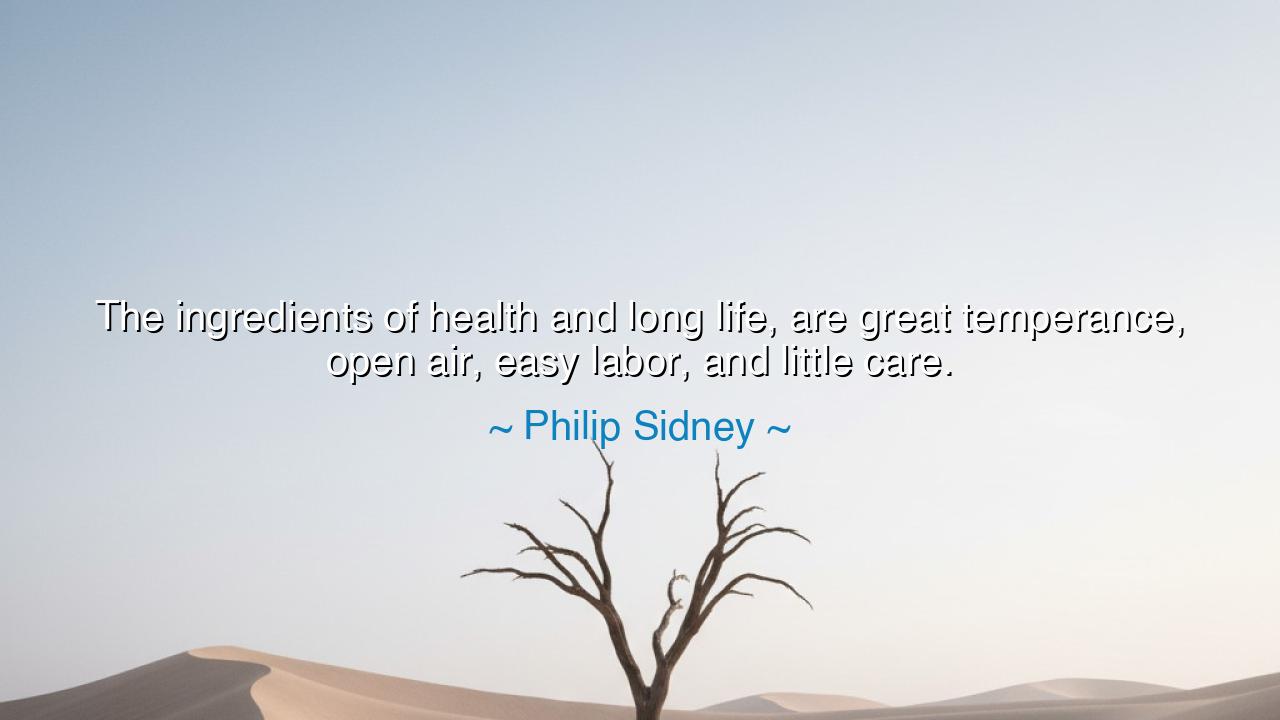
The ingredients of health and long life, are great temperance
The ingredients of health and long life, are great temperance, open air, easy labor, and little care.






The words of Sir Philip Sidney, poet, knight, and philosopher of the Elizabethan age, shine like a torch passed from a wiser era: “The ingredients of health and long life, are great temperance, open air, easy labor, and little care.” In this single sentence, Sidney distilled a lifetime of observation and virtue. It is a formula not merely for the preservation of the body, but for the serenity of the soul — a recipe for living in harmony with both nature and conscience. For in his time, as in ours, people sought secret potions and rare elixirs to prolong life, while the true medicine lay quietly in simplicity itself.
To understand “great temperance” is to grasp the root of health. It is the discipline of desire, the wisdom to know when enough is enough. Sidney reminds us that the excesses of pleasure — in food, drink, ambition, or wealth — are slow poisons disguised as joys. The ancients taught this long before him. The philosopher Epicurus, often misunderstood as a lover of indulgence, in truth preached moderation. He ate little, valued friendship, and found joy in the absence of pain. Likewise, Sidney calls us to temperance not as denial, but as mastery — for the person who rules his appetites rules his destiny.
The second ingredient, “open air,” speaks to the life-giving power of nature. In the modern world, men and women have caged themselves in stone and glass, forgetting the old covenant between the earth and the body. Sidney, who lived and died as a knight on the battlefield, knew the strength that flows from sunlight, the wind, and the breath of dawn. The poet William Wordsworth would later echo this truth, finding in the hills and streams of England the secret to a quiet mind and a vigorous spirit. To live long and well, one must breathe deeply of the world — to walk, to toil, to feel the pulse of the living earth beneath one’s feet.
Then comes “easy labor,” a phrase filled with quiet wisdom. Sidney does not praise idleness, nor does he glorify toil that breaks the spirit. Rather, he honors the rhythm of useful work — the kind that strengthens without enslaving. The farmer tending his fields, the craftsman shaping his art, the teacher sowing knowledge — all labor that keeps the hands busy and the heart light. The ancients knew this balance well. Even the Roman statesman Cicero tended his garden after days of debate, calling it “the purest of human pleasures.” Work, when joined with purpose, becomes not burden but balm.
But perhaps the most elusive of Sidney’s ingredients is “little care.” By this, he means not carelessness, but freedom from needless worry. Anxiety gnaws more fiercely than age. A heart burdened by fear, envy, or regret weakens even the strongest body. Sidney himself, though a warrior, was known for his calm courage — his ability to meet life and death with grace. When mortally wounded at the Battle of Zutphen, he famously gave his water to another soldier, saying, “Thy necessity is yet greater than mine.” That act of selflessness was the purest example of “little care” — not because he cared for nothing, but because he cared rightly, placing the soul above the flesh.
These four elements — temperance, air, labor, and peace — are not separate, but bound together like the four pillars of a temple. To lose one is to weaken the whole. Together, they form a life that is both strong and serene, where health is not a frantic pursuit but a natural harmony. Sidney’s wisdom reminds us that longevity is not measured in years, but in the depth and clarity of each day. He does not promise immortality; he offers something greater — a life well-lived, untroubled, and whole.
The lesson is as relevant now as it was in the sixteenth century: seek not wealth, but balance; chase not eternal youth, but inner stillness. The one who practices temperance, breathes freely, labors gently, and worries little, shall live not only long but nobly. These are not privileges of birth or rank — they are choices made daily, gifts given to those who honor simplicity.
And so, the teaching endures: the path to health and long life is not hidden in mystery or medicine, but written in the rhythm of the natural world. Eat with restraint, live beneath the open sky, work with steady joy, and let go of needless care. Then you shall find what Sidney and the sages before him found — that the art of living well is, in truth, the art of living simply.






AAdministratorAdministrator
Welcome, honored guests. Please leave a comment, we will respond soon